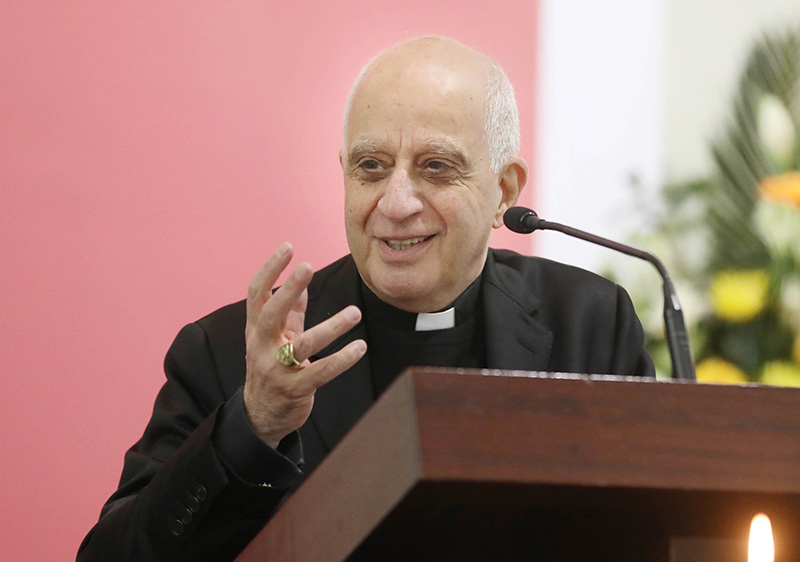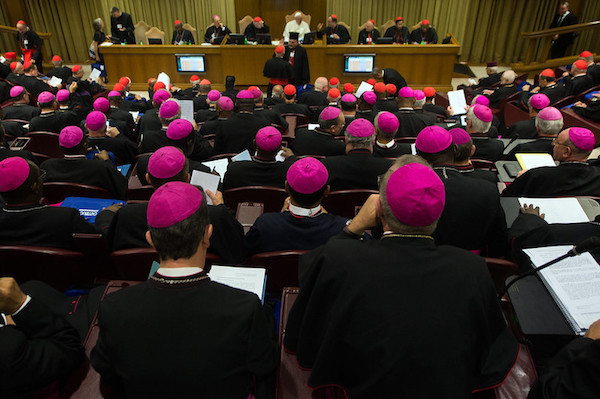The Synod of Bishops will include female voting members for the first time, organisers revealed today in a landmark development for the Church’s synod process.
Pope Francis has approved changes to allow lay women, including religious sisters, and lay men, to take part as full members of the synod summit in October, emphasising that it restores a model of the Church as the “People of God” and where the hierarchy is in close relationship with the laity.
Pope St Paul VI established the Synod of Bishops in 1965, at the end of the Second Vatican Council, and since then its gatherings have been made up of bishops, ordained presbyters and male religious.
Women have only ever taken part as “auditors” or observers without the right to vote on its outcomes.
The changes, which mean that 75 per cent of the synod assembly this October will be bishops and 25 per cent non-bishops, are seen as a move by the synod away from a gathering of the hierarchy towards a synod of the people.
Notably, the central organising office in Rome is titled the “General Secretariat for the Synod” rather than the secretariat of the Synod of Bishops.
Announcing the changes today, the synod office pointed out that Paul VI said the synod structure could be “further perfected with the passage of time”, with Francis transforming it into the primary vehicle through which to implement his pastoral agenda.
This pontificate has tried to embed synodal listening, dialogue and discernment processes in every level of the Church.
It was to this end that the Pope launched a global “synod on synodality” process in October 2021, which has seen an unprecedented consultation of the worldwide Church and will culminate in two Vatican summits in October 2023 and October 2024.
The changes announced on 26 April concern the makeup of the assembly which will meet from the 4-29 October in the Vatican.
First, five female sisters and five male religious will be elected to represent the religious orders at the gathering. Second, the assembly will include 70 non-bishop voting members representing “various groupings of the faithful of the People of God”, including priests, religious, deacons and lay members.
Regional bishops’ conferences and assemblies of the Eastern Churches are being asked to submit 140 candidates for the Pope to choose from and half of these must be women. The synod office has also asked that young people be included.
In addition to the 70, Francis can nominate non-bishop members, including lay women and men, of his own.
Professor Anna Rowlands, a theologian from the University of Durham who has been seconded to the Holy See to help the team organising the synod, told The Tablet: “There will be much joy as a result of today’s announcement that the Synod will include a fuller participation of lay men and consecrated and lay women.”
She added: “This is a most welcome move that will continue to build the inner energy of the whole community towards the task of the renewal of the Church in its mission. This can be seen, I think, as a fruit of the listening mode of this synodal path.”
The synod office said that non-bishop members put forward for selection should have “theoretical and practical knowledge” of the synod and have participated in the process. They are not to be “elected”.
Meanwhile, bishops' conferences are asked to elect members to send to the synod, with the number that conferences send determined by size.
The synod office has told local hierarchies that those elected should have “theoretical and practical” knowledge “of the subject matter to be dealt with in the [synod] assembly.”
The synod summit in October will include non-voting experts and, for the first time, “facilitators” who will be asked to help with the process at different moments in the assembly.
“Fraternal delegates” will represent other Christian denominations, participating as non-voting members.
The synod secretariat has stressed that the gathering remains “episcopal” in nature, with the non-bishops not elected as representatives but chosen by the Pope on the recommendation of bishops.
Furthermore, the secretariat points out that the lay presence in the synod assembly reflects that the process began with the consultation with the people and expresses the “relationship between the prophetic function of the People of God and the discernment function of the pastors”.
The changes ensure that the bishops do not gather to decide the future alone but in a Church where people and leaders walk together.
The latest decision comes as the synod completes the continental phase of the process, with a working document for the October 2023 meeting expected to be released at the end of May.



 Loading ...
Loading ...